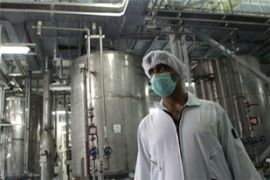S Africa urges Iran sanctions pause
Pretoria says six world powers should partially drop financial and other sanctions.

Published On 20 Mar 2007
The draft resolution mainly expands the list of Iranian individuals and institutions subject to an assets freeze abroad and an embargo on the export of weapons.
Cooling-off period
Dumisani Kumalo, South Africa’s ambassador to the UN and this month’s council president, had proposed the removal of parts of the list including Iran’s Bank Sepah and several businesses run by the Guards Corp, according to diplomats.
| Your Views |
|
“It is stubbornness and pride on Iran’s part that has led to this impasse, and it can only lead to disaster for Iran” Diom1982, Cork, Ireland |
He also backed a 90-day cooling-off period first proposed in January by Mohammed ElBaradei, the UN nuclear watchdog chief calling for the suspension of sanctions the same time as Iran halts its enrichment work.
Kumalo said: “We are looking to see that it addresses issues of proliferation and addresses the issues of political negotiations.
“And we want the role of the IAEA [International Atomic Energy Agency] protected.”
Kumalo’s stance that the draft “was not written by God” is expected to draw a heated debate before voting begins.
Emyr Jones Parry, Britain’s ambassador, who introduced the draft to the council last week, said: “I don’t, myself, see the South African amendments themselves as being helpful to the sort of approach I’ve adopted, but that’s for discussion.”
Inspectors barred
Mahmoud Ahmadinejad, Iran’s president, is expected to make Iran’s case on how the uranium enrichment is for civilian use before the council votes, which date has yet to be set.
Adoption of the resolution requires nine votes and no veto.
Meanwhile, Iran has stopped UN inspectors from visiting an underground bunker where it is building an industrial-scale plant to make enriched uranium, diplomats said on Monday.
Iran had promised “frequent inspector access” to the site in Natanz, the IAEA had said in February.
Diplomats speaking anonymously said inspection delays were subject to the normal scheduling and legal issues, and inspectors were expected to return to the plant on Tuesday.
Iran would be violating its obligations under the nuclear Non-Proliferation Treaty by blocking access to Natanz.
Iranian officials were not immediately reachable for comment.
Source: News Agencies